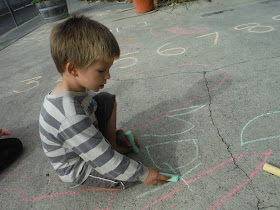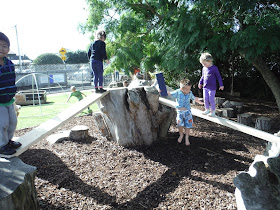We often get asked how we support children in getting ready
for primary school. How do we teach them their ‘ABC’s and 123’s?’ and there is
the occasional question thrown our way in regards to whether we run a ‘four
year old or school prep’ programme. The response that we have to these queries
is often meet with surprise and astonishment.
As a team at Mairtown we are very clear about how we view ‘school
readiness’ and how this is implemented into our programme and the environment. This
view is underpinned by a number of aspects which include building on children’s
social competencies, developing independence, and developing good attitudes
towards risk taking and learning.
This is supported by plentiful opportunities for free play,
lots of hands on ‘real’ experiences, using the arts as a language for children
to express their ideas and knowledge, allowing children to revisit learning
experiences over and over and through having an environment that is predicable
(to name just a few things).
We believe that if we support children in a holistic manner
then they will thrive, their self-confidence will grow, which will in turn give
them an array of skills that they can utilise not only during their transition
to school but also throughout their lives.
I thought I would break a few of these aspects down briefly. So
firstly, why is developing social competencies important for getting ready for
school? Developing positive social competencies supports children in working
well with others, it helps with self-regulation and communicating feelings. All
these skills are welcomed warmly when children enter their new entrant
classroom.
Rubin and Rose-Krasnor (1992) define social competence as, “the
ability to achieve personal goals in social interaction while simultaneously
maintaining positive relationships with others over time and across situations.”
As teachers of young children we foster developing strong
social competencies by celebrating and giving a lot of positive praise when we
see children working hard on regulating their emotions, communicating their
feelings, listening, negotiating, sharing, turn taking and showing empathy.
Play is one of the best ways that children explore different ways that social competencies
work.
Play is something that we celebrate and don’t take for
granted as we know that children use play to explore many different concepts,
life skills and learning areas. It is disappointing when we hear comments about
how children are ‘just playing’ so we will defend play and its greatness by explaining
the importance of it, how this supports learning and preparation for school. Play
involves working together, concentrating and following through with tasks, being
creative, exploring language and self-expression, building on confidence,
developing gross and fine motor skills to name just a few things.
Davis (2014) acknowledges that "Play isn’t some sort of
soft approach before the ‘real’ learning begins. That idea is a hangover from
education’s industrial era. Play has been consistently described across time as
central to cognitive, language, cultural, and social development.”
At Mairtown Kindergarten we thoughtfully provide an engaging
environment, follow children’s interests, actively listen to the child, give
them time and space and allow children the access to authentic and real experiences.
By doing this we are showing that we value them and the flow on effect is that
they feel empowered and encouraged to give things a go. Having a positive
attitude towards trying things out is also going to be of great value in the
classroom and through out life.
“Children understand
and remember concepts best when they learn from direct personal
experience.” (Joseph Cornell)
Having a positive attitude towards risk taking and doing
things that make you feel a little worried creates lots of empowering learning
experiences. We create an environment that promotes risk taking, encourages
children to assess risk and work out what is appropriate etc. We gently assist them
through these experiences, small steps to large leaps.
"Risk
perception is like a muscle that needs to be developed and flexed." (Blincoe, 2015)
Risk taking is not only tree climbing and rock jumping, risk
taking can be supported in many areas for example the simple act of putting pen
to paper, asking another child to play with them and using the hot glue gun
after burning the end of their finger. All of this helps develop a positive
attitude towards risk taking and is wonderful for lifelong learning.
“Successful learners
have positive beliefs and attitudes towards learning. They are not afraid of
new experiences and can see learning opportunities in many different settings.”
(Alberta, 2002)
A predictable environment, full of open ended resources is
another tool that we use to support our children in developing skills and
knowledge to support their ‘school readiness’. By providing an environment that
is predictable this nurtures a strong sense of belonging for our children and
their families as they quickly learn where they can find things and access resources
to support their interests. Open ended resources are so wonderful because they support creative thinking and meaningful engagement for our children.
Along with this we also leave resources and experiences set
out for lengthy periods of time to allow children to revisit experiences over
and over again. We know that new learning is influenced greatly by past
learning and children’s developing knowledge is fostered greatly when they have
the opportunity to continually revisit learning experiences. “If we continually
change the materials, experiences and resources that children play with, then
we risk short-changing children’s experience. While some change is important to
maintain children’s interest and introduce new ideas, change for the sake of
change reduces the chances children have to re-engage with and master materials
and ideas. Children will benefit more from deep involvement with a few
well-chosen experiences than from superficial involvement with many.” (NQS-PLP, 2012).
So while children are involved in all this play based learning
in our thoughtfully set up environment they are engaging with many different
learning concepts that they will take with them to primary school. They are playing
with mathematical, scientific and literacy concepts to name just a few things. Children
are more motivated to engage in meaningful learning experiences when they are having
fun and their interests are acknowledged.
We want our children to leave Mairtown Kindergarten capable and
competent, with a wonderful attitude towards learning and risk taking. We want
them to have a bag of tricks full of skills and knowledge that will give them
the confidence to ‘give things a go’ and not be afraid to not always succeed at
a task, knowing that in failure comes rich learning.
One of the biggest and most frustrating comments that we
hear every so often is, ‘Now my child is heading off to school to do real
learning!’ At Mairtown we have children who are living and breathing meaningful
learning every day and we are proud to be providing them with these
opportunities. This is the time when children are developing lifelong learning
skills, attitudes and ways of being that will support them for many years to
come. We take our jobs of fostering this very seriously, we are professionals who care deeply about what we do and in no way want to stifle our children’s
desire to learn about and question their world. Yes we want our children to
know how to write their names, recognise colours, shapes and how to count to
ten. However more importantly we want them to feel empowered and valued and we
whole heartedly try our hardest to accomplish this.
“The goal of early childhood education should be to activate
the child’s own natural desire to learn.” (Maria Montessori)
Hei
konā mai,
Zair







































So beautifully articulate. Thank you for advocating for the fun, enjoyment and real learning that children experience through play. Beautiful pictures
ReplyDeleteWell said. As a primary school new entrant teacher currently working in ECE I love the way you have written this and agree wholeheartedly. Your illustration of the multitude of ways you provide real learning and development opportunities for your tamariki is EXACTLY what is needed as children approach school - just wish it could continue in this way up until at least year three at school! Thanks for inspiring and encouraging me (-:
ReplyDeleteGreat to see this type of content posted. Kids will love this. Thanks for sharing such a lovely blog with us. I hope you will share more and more educational blog with us.
ReplyDeleteWell said! It always (every year!) seems so hard to explain to parents how important play is for their child, and too easy to back down and focus more and more on numbers and letters at the expense of play. This will give me inspiration and motivation to continue the challenge of articulating the value of play to parents- you have explained it very well!
ReplyDeleteLove to see the work documented and articulated in such a way everyone can understand. Our Service in Qld also runs in the exact same philosophy and explains those skills that we allow children to develop before they head to school.
ReplyDeleteThank you for sharing!
Beautifully written, can I quote you?!
ReplyDeleteOf course Lisa, thanks your kind comments.
ReplyDelete